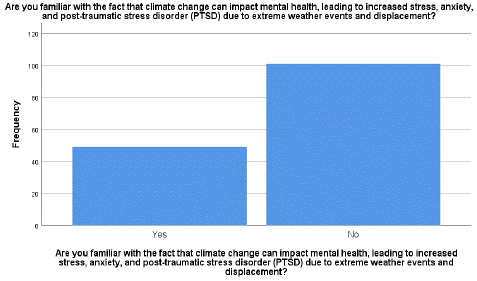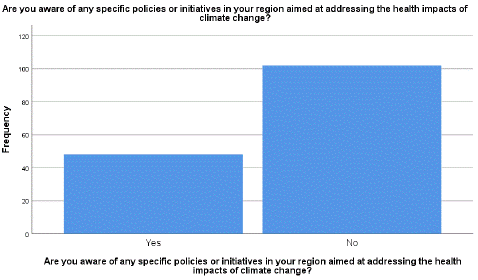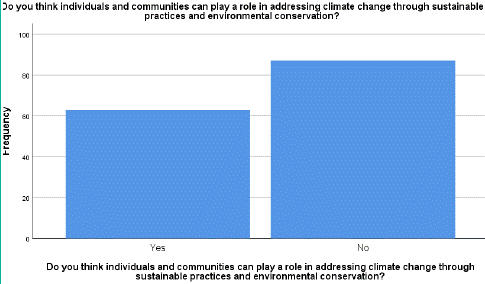
Rapid Communication
Austin J Nurs Health Care. 2023; 10(3): 1088.
Level of Knowledge and Awareness Regarding Climate Change and its Impact on Health
Shama Nazmeen¹*; Riffat Naheed²; Jamila Fatima³
¹BSN, Shifa College of Nursing, STMU, Sector H-8/4 Islamabad, Pakistan
²MSN, Shifa College of Nursing, STMU, Sector H-8/4 Islamabad, Pakistan
³BSN, Shifa College of Nursing, STMU, Sector H-8/4 Islamabad, Pakistan
*Corresponding author: Shama Nazmeen BSN, Shifa College of Nursing, STMU, Sector H-8/4 Islamabad. Farash Town, Phase II, House No. 2957, Street No. 44, Islamabad, Pakistan. Tel: 0344-2683599 Email: Shamanazmeen284@gmail.com
Received: November 17, 2023 Accepted: December 22, 2023 Published: December 29, 2023
Abstract
Introduction: Climate change is the prevailing issue on hand. It has both direct and indirect impact on public health that ranges from increasing respiratory, infectious and vector-borne diseases to its impact on mental health, agricultural sector and food security. This increases disease burden and raises challenge for health sector in many ways. Nurses and other healthcare professionals are at key position to address this issue.
Purpose: The purpose of this study is to investigate level of knowledge and awareness regarding climate change and its impact on health among general population of public sector and Bari Imam Community.
Methods: Descriptive cross-sectional study was conducted among general population of Bari Imam Community and public sector. Data was collected from 150 participants. A structured questionnaire was used for data collection. The data were analyzed using SPSS version 26. The results were expressed in descriptive statistics.
Results: Study findings show that 62% participants have knowledge about climate change. Out of 150 participants 80% thinks that climate change has impact on health. Only 32% participants are familiar with the fact that climate change can also impact mental health. 68% of participants are not aware policies and initiatives for mitigating impact of climate change. Only 42% of participants think that they can individually play a role in addressing climate change.
Conclusion: Climate change needs to be viewed as a public health issue and it is important to address the issue of climate change to decrease morbidity and mortality rate.
Keywords: Climate change; Health, Nurses; Impact; Knowledge
Introduction
Climate change refers to shifts in temperature and weather patterns over a long period of time. These shifts maybe natural. Human activities have been main deriver of climate change [1]. Climate change can affect food safety, exposing people to contaminated foods that can result in foodborne illnesses [2]. In comparison to any previous time in the history of modern civilization, the Earth's climate is changing more quickly, and this is mostly due to human activities. Globally, people are already feeling the effects of climate change, and those effects are expected to get worse in the future. The economy, social systems, water quality, ecosystems, agriculture and food production, infrastructure, human health, and quality of life are just a few of the ways that climate change impacts communities [3].
The climate suitability for infectious disease transmission has been growing rapidly since the 1950s, with a 15·0% increase for dengue caused by Aedes albopictus in 2018, and regional increases for malaria and Vibrio bacteria. Globally, 7 million people die every year from air pollution. The health burden is substantial. Every year more than 1 million deaths occur as a result of air pollution from coal-fired power, and nearly 390 000 of these deaths were a result of particulate pollution in 2018. Morbidity and mortality rate was increased in 2019, where vulnerable populations were exposed to an additional 475 million heatwave events globally. During the past 20 years, there has been a 53·7% increase in heat-related mortality in people older than 65 years, reaching a total of 296 000 deaths in 2018 [4]. Within an average population of over 16 million, Karachi is the most populous metropolis in Pakistan. Concerns about health, the environment, and the economy are raised by this estimate. The incidence of serious infectious illnesses may rise as a result of climate change, particularly when it comes to changes in yearly weather patterns like the monsoons [5].
Multiple arboviral illnesses, including dengue virus, chikungunya virus, zika virus, west nile virus, and Japanese encephalitis virus, have the potential to spread in Karachi. In 2017, more than 30,000 residents of Karachi contracted the Chikungunya virus. Furthermore, the country has seen a sharp spike in dengue infections as a result of the recent floods, going from 3204 cases in 2018 to 45,120 cases in 2019. According to a recent research from 2017, gastrointestinal problems were reported by 14.9% of Karachi inhabitants, while malaria affected up to 22.4% of the city's population [5].
Disasters involving weather and climate-related risks cause thousands of fatalities globally each year and add to the world's disease burden [6]. The threats that climate change poses to human health are emphasized by the World Health Organization. Every year, The Lancet's "Commission on Health and Climate Change" which was founded in 2015, reports on the situation, providing various data and indicators on the impacts of climate change on population health as well as on the political and health policy choices made to lessen those negative effects.
The most current report was revised and released in December 2020. Increased morbidity due to dehydration, cardiovascular events, and infectious illnesses, as well as more often occurring severe temperatures (such as heat waves), might risk human life and reduce working hours [7]. If nothing is done to lessen the effects of climate change, the average world temperature may rise by 3-5°C by the end of the century. As a result, there are now fewer frigid winter days and more hot summer days [8]. In many areas, the spread of vector and water-borne illnesses is happening [7].
Climate change is linked to an increase in allergies and autoimmunity in those who were previously disease naive, as well as the aggravation of respiratory allergy disorders that were already present [9]. Increased cardiovascular disease, injuries, and early deaths from extreme weather events, changes in the prevalence and geographic distribution of food and water-borne infections, and other infectious diseases are some other health impacts of these disruptions [2].

Figure 1: 32.7% is familiar with the fact that climate change can also impact mental health while 67.3% are not familiar.

Figure 2: 32% participants are aware of policies or initiatives regarding climate change while 68% are not aware.

Figure 3: 42% participants do think that individuals can play a role in addressing climate change while 52% do not think that individuals can also play role.
Pathogen-vector-host systems have been adversely impacted by recent climate change. There are now many examples of the early impacts of climate change on animal, vector-borne disease burden, while the most severe vector-borne disease outbreaks affecting humans tend to be affected by a myriad of complex socioeconomic factors and climate [10]. There is evidence in the growing body of research on the relationship between climate change and mental health that extreme weather events, which are becoming more common, intense, and complicated due to climate change, can trigger Post-Traumatic Stress Disorder (PTSD), Major Depressive Disorder (MDD), anxiety, recovery, fatigue, depression, complicated grief, survivor guilt, vicarious trauma, and suicidal ideation [11].
Climate change poses significant challenges to the agricultural sector in Pakistan, particularly for small subsistence farmers and rural populations. There is urgent need for adaptation strategies to build resilience and reduce poverty. Pakistan is highly vulnerable to climate change, particularly with regards to droughts, floods, temperature fluctuations, and changes in precipitation. It necessitates adaptation strategies for the agricultural sector [12].
By influencing choices to help reduce greenhouse gases and other pollutants in hospitals, nurses can address the environmental effect of healthcare facilities. In order to help communities and the health sector prepare for future changes, nurses must engage [13]. In this global emergency, we have a duty to take action, advocate for change, and affect policy on a personal and professional level [14].
Published studies of nurses' observations of climate health impacts are very few. All these studies show that there is need for addressing the issue of climate change by healthcare professionals. The health effects of climate change are not highlighted in the headlines or on social media, which is why the topic was unknown. This also shows that the issue needs to be explored more broadly specifically in Pakistan.
Research Question
The purpose of this study is to investigate the level of knowledge and awareness regarding climate change and its impact on health among general population of public sector and Bari Imam Community. The research questions addressed are:
1. What is the level of knowledge and awareness among general population regarding climate change and its impact on health?
2. What is level of knowledge regarding mental health impacts of climate change?
3. What is level of awareness among general population regarding initiatives and individual role in addressing climate change?
Methods
A descriptive cross-sectional study was conducted in Bari Imam Community, Islamabad from 9 September to 3 November, 2023 using a structured questionnaire containing close-ended questions. Questionnaire was validated by taking feedback from experts. Before the final data collection pilot testing was done including 50 participants. Final data was collected from 150 participants using convenient sampling. Before data collection informed consent was taken from participants. The interviewer used a tool with closed-ended questions and provided the participants with a range of possible responses. The questionnaire did not contain any jargon. For the research databases Google Scholar, CINAHL, and PubMed were used. Data were analysed using Statistical Package for Social Sciences program (SPSS) version 26. Results were expressed in frequency and percentages.
Ethical Consideration
Ethical codes of conduct are to be strictly adhered to all stages of the study and all the information which was taken from participants in the study maintained strict anonymity and confidentiality.
Results
Out of 150 participants 80.7% believe that climate change is occurring. 62% have knowledge regarding climate change, while 38% don not have knowledge.
As shown in table (1) 80% participants think that climate change has impact on health while 20% do not think that climate change impacts health.
Frequency
Percentage
Valid
Yes
80
80.00%
No
20
20.00%
Total
100
100.00%
Table 1: Do you think climate change has an impact on human health?.
Table 2 shows that 67.3% participants are aware that extreme weather events can be increased by climate change while 32.7% are not aware.
Frequency
Percentage
Valid
Yes
101
67.30%
No
49
32.70%
Total
150
100.00%
Table 2: Are you aware that extreme weather events such as heatwaves and hurricanes can be increased by climate change and pose health risks?.
As shown in table (3) 76% participants know that air pollution is worsened by climate change and can lead to respiratory and other health issues while 24% do not know.
Frequency
Percentage
Valid
Yes
114
76.00%
No
36
24.00%
Total
150
100.00%
Table 3: Do you know that air pollution is worsened by climate change and can lead to respiratory problems and other health issues.
Discussion
This study examined level of knowledge and awareness among general population regarding climate change and its impacts on health. The findings of the study show that participants do have knowledge regarding climate change and its impacts on health but there is no awareness regarding initiatives on climate change and nurses can play a major role to address this issue. Healthcare professionals can enhance the development of strong healthcare systems from a global health viewpoint by seeking significant queries such as: Does our healthcare the organization work together successfully across numerous disciplines? How efficiently do we determine and reach vulnerable patient populations during climate-related crises? How accessible are patients and their families to learning, and can we educate them about the negative health impacts of climate change? Nurses actively contribute to the promotion of planetary health in the workplace by advocating for modifications that improve the surroundings, educating patients and their families regarding the adverse health impacts of the climate change and strategies to reduce them, and leading green teams to identify and decrease wasteful or ecologically detrimental workplace techniques. Furthermore, nurse practitioners possess the capacity to assume leadership roles in local and regional adaptation initiatives through active engagement in community outreach initiatives, cooperation with local authorities to identify susceptible and endangered populations, mobilizing communities, and formulating localized and organizational emergency strategies. Nurses often assume a prominent role in the creation, execution, evaluation, and incorporation of workplace and administrative policies. By establishing thoughtful and adequate policies, humanity can reach a condition of improved global health and prosperity [15]. Mental health issues are closely connected to an individual's geographical, social, environmental and socioeconomic. Furthermore, the potential negative impacts on physical health resulting from climate change also present a threat to mental well-being. Hence, there exist correlations between climate change and health that can influence mental well-being. Moreover, an individual's mental health status can impact their capacity to manage or confront climate change [6].
Future research should include larger sample size to quantify climate-related health impacts. There is a need to determine the association between the observed health changes and climate change. In addition, there needs to be broader regional and national study of climate health impacts as well as investigation of the impact of climate change education. Climate related health research should include the impact of nurses' climate and health education on patient behavior and patient outcomes. It should also be emphasized that observations that nurses make are important and the findings allow them to change their actions and influence the health of their patients.
There are some limitations to this study. This may have limited the identification of relevant findings as well as generalization of the observation. Like all research studies, the findings of this study are not generalizable, but an important start to inquiry of climate-related health impacts. One of the limitation of study is that it has limited comparison with other studies due to very few literatures related to climate change. Lack of time, financial constraints and accessibility of resources were some other limitations of the study.
Conclusion
Climate change has been shown to cause and exacerbate chronic health conditions such as respiratory diseases, cancer, cardiovascular disease, and mental disorders. Besides that, climate change also impacts agricultural sector and food security leading to poverty. As these health effects are a growing health threat around the world, it is very important to address this issue. It should also be noted that nurses along with other healthcare professionals are a trusted and respected professions. Nurses have a unique opportunity to use their voice to advocate for their patients and to influence climate change policy. The voice of nurses is essential in promoting climate change mitigation and adaptation, as well as understanding the health impacts of climate change.
References
- Guo Y, Li S. Heat exposure and human health in the context of climate change. 2022.
- Segal TR, Giudice LC. Systematic review of climate change effects on reproductive health. Fertil Steril. 2022; 118: 215-23.
- Kolbuk ME, Gillespie GL, Hilderbrand L, Stone EL. Mitigating the effects of climate change on health and health care: the role of the emergency nurse. J Emerg Nurs. 2021; 47: 621-6.
- Cai W, Zhang C, Suen HP, Ai S, Bai Y, Bao J, et al. The 2020 China report of the Lancet Countdown on health and climate change. Lancet Public Health. 2021; 6: e64-81.
- Babar MS, Tazyeen S, Khan H, Tsagkaris C, Essar MY, Ahmad S. Impact of climate change on health in Karachi, Pakistan. J Clim Chang Heal. 2021; 2: 100013.
- Di Napoli C, McGushin A, Romanello M, Ayeb-Karlsson S, Cai W, Chambers J, et al. Tracking the impacts of climate change on human health via indicators: lessons from the Lancet Countdown. BMC Public Health. 2022; 22: 663.
- Dupraz J, Burnand B. Role of health professionals regarding the impact of climate change on health–an exploratory review. Int J Environ Res Public Health. 2021; 18: 3222.
- Ruth ML, Hannele T, Jouni J, Lauri K Iira. Finnish nurses’ perceptions of the health impacts of climate change and their preparation to address those impacts. 2021; 56: 365-371.
- Ray C, Ming X. Climate change and human health: a review of allergies, autoimmunity and the microbiome. Int J Environ Res Public Health. 2020; 17: 1-7.
- Caminade C, Mcintyre KM, Jones AE. Impact of recent and future climate change on vector-borne diseases. Ann N Y Acad Sci. 2019; 1436: 157-73.
- Clark T, Zolnikov TR. Climate change and mental health. Palgrave Handb Clim Resil Soc. 2022; 2: 1201-26.
- Fahad S, Wang J. Climate change, vulnerability, and its impacts in rural Pakistan: a review. Environ Sci Pollut Res Int. 2020; 27: 1334-8.
- Cook C, Demorest SL, Schenk E. Nurses and climate action. Am J Nurs. 2019; 119: 54-60.
- Mitchell PH. Nursing’s mandate in climate change. Int Nurs Rev. 2021; 68: 279-80.
- Kalogirou MR, Olson J, Davidson S. Nursing’s metaparadigm, climate change and planetary health. Nurs Inq. 2020; 27: e12356.